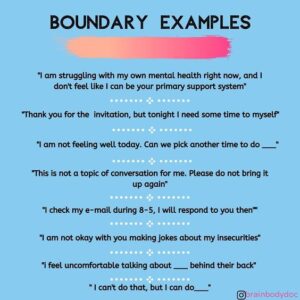In the current fast-paced society, mothers are pulled in a variety of directions making it difficult to set healthy boundaries to meet their own needs. Managing work place responsibilities, relationships and familial needs often causes mothers to have little time to take care of themselves and their own needs. Mothers often feel pushed and pulled while experiencing guilt when they are not able to constantly achieve at an optimal level. This lack of balance can lead to chronic fatigue, burnout and an overall sense of defeat.
In light of such demands, it is pivotal for mothers to set healthy boundaries with their family, friends, significant others and work colleagues. Boundaries allow mothers to have a sense of control. They create space for self-care, promotes happiness and allows mothers to live in a way that they want.
As you continue to read, answer the following questions.
- Do you feel that you are able to enjoy your life?

- Are you constantly running from one place to another?
- Do you have time to take care of your own needs?
- How tired do you feel on a daily basis?
- Are you living your life according to your priorities, values and beliefs?
As you ponder the above questions, think about how boundaries can help you make adjustments so that you can feel fulfilled and happy in your life. Below is a a guide to help mothers set healthy boundaries.
What Are Boundaries and Why Are They Needed?
Personal healthy boundaries are the limits and rules that individuals set for themselves within relationships, interactions and communication with others. These healthy boundaries define what is and is not acceptable behavior from others. Also, they help to protect an individual’s physical, emotional and mental well-being. They can include setting limits on physical touch, emotional intimacy, time, finances and personal space, as well as setting rules for communication, decision-making, and problem-solving. Personal boundaries can vary from person to person, and it is important for individuals to communicate and respect each other’s boundaries in any relationship.
Types of Boundaries
There are a variety of healthy boundaries a mother needs to consider. Identifying your needs and desires will allow you to move forward in setting boundaries. Although there are numerous types of boundaries, those listed below are often areas that mothers need to reflect on and attempt to adjust.
- Emotional boundaries: Being able to say no to someone who wants to talk about their problems when you’re not in the mood to listen.
- Time boundaries: Setting limits on how much time you’re willing to spend with someone, or telling them you need time alone.
- Decision-making boundaries: Setting limits on how much control someone has over your life, such as not allowing them to make decisions for you.
- Problem-solving boundaries: Setting limits on how much you’re willing to help someone with their problems, and telling them you need to take care of yourself first
- Work boundaries: Setting limits on how much work you’re willing to do, or not allowing someone to take advantage of you by overloading you with work.
- Social boundaries: Setting limits on how much time you spend with certain people, or not allowing someone to control who you can and cannot be friends with.

Setting Healthy Boundaries
When setting boundaries, make sure the boundary is not to rigid and not to porous. These types of boundaries do more harm than good.
Rigid boundaries are characterized by a person having very strict and inflexible limits and rules for themselves and others. They may not be open to new ideas or experiences and may have difficulty trusting others. They may also have difficulty expressing their own needs and wants and may struggle with setting and maintaining healthy boundaries.
Porous boundaries, on the other hand, are characterized by a person having more flexible and open limits and rules. They may be open to new ideas and experiences and may have an easier time trusting others. They may also be more comfortable expressing their own needs and wants but may have difficulties in setting clear limits and protecting themselves from others.
Healthy boundaries are a balance between rigid and porous boundaries. They are flexible enough to allow for growth and change; but also strong enough to protect and care for the individual’s own needs and wants. Healthy boundaries allow for open and honest communication, mutual respect, and balance in relationships. They are based on the individual’s own values, beliefs, and needs rather than society’s expectations or other’s needs.
It’s important to recognize that healthy boundaries may change over time. What is considered healthy boundary in one situation or with one person may not be the same in another situation. It’s important to regularly evaluate, communicate and adjust boundaries as needed to ensure they are meeting the individual’s needs and the relationship’s needs.

Boundaries & Guilt
Try not to feel guilty for prioritizing yourself as setting healthy boundaries. As a mother, children and their needs often come first leaving little time to meet your own. Remember, that you cannot be present for your child if you are not present for yourself. You are a role model to your children. You can show them the importance of balancing the needs of the family, work and your own.
By considering the boundaries from the various aspects of your life, you can free up time and energy. This will lead to a stronger sense of self-worth, functionality and ability to ENJOY YOUR LIFE!
Start Therapy to Set Boundaries, Manage Anxiety & Balance Your Life in Baltimore, MD
If you are wanting to get additional support then we can help. Our Baltimore therapists specialize in treating anxiety in children. We can help them learn valuable skills that will help them cope in healthy ways throughout their life. To get started, follow these steps.
- Reach out for a free consultation at our Baltimore area therapy practice
- Schedule your first appointment for therapy
- Learn how to navigate motherhood, work through stressors and improve your overall quality of life.
Other Therapy Services We Offer in Maryland & the Washington DC Area
At Crystal Waters Counseling Centers we offer a variety of in-person and online therapy services. They are available for children, teens, college students, women, and adults throughout Maryland. This includes counseling for both anxiety and depression. As well as EMDR Therapy, therapy for life transitions, and parent coaching.


